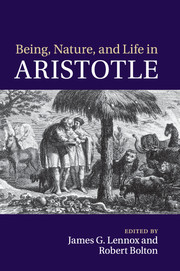Book contents
- Frontmatter
- Contents
- Preface
- Notes on contributors
- Acknowledgments
- Allan Gotthelf: a biographical sketch
- Note on abbreviations
- Introduction
- 1 Teleology, Aristotelian and Platonic
- 2 Biology and metaphysics in Aristotle
- 3 The unity and purpose of On the Parts of Animals 1
- 4 An Aristotelian puzzle about definition: Metaphysics Ζ.12
- 5 Unity of definition in Metaphysics Η.6 and Ζ.12
- 6 Definition in Aristotle's Posterior Analytics
- 7 Male and female in Aristotle's Generation of Animals
- 8 Metaphysics Θ.7 and 8: Some issues concerning actuality and potentiality
- 9 Where is the activity?
- 10 Political community and the highest good
- Allan Gotthelf's contributions to classical philosophy
- References
- Index locorum
- General index
4 - An Aristotelian puzzle about definition: Metaphysics Ζ.12
Published online by Cambridge University Press: 06 December 2010
- Frontmatter
- Contents
- Preface
- Notes on contributors
- Acknowledgments
- Allan Gotthelf: a biographical sketch
- Note on abbreviations
- Introduction
- 1 Teleology, Aristotelian and Platonic
- 2 Biology and metaphysics in Aristotle
- 3 The unity and purpose of On the Parts of Animals 1
- 4 An Aristotelian puzzle about definition: Metaphysics Ζ.12
- 5 Unity of definition in Metaphysics Η.6 and Ζ.12
- 6 Definition in Aristotle's Posterior Analytics
- 7 Male and female in Aristotle's Generation of Animals
- 8 Metaphysics Θ.7 and 8: Some issues concerning actuality and potentiality
- 9 Where is the activity?
- 10 Political community and the highest good
- Allan Gotthelf's contributions to classical philosophy
- References
- Index locorum
- General index
Summary
The aim of this paper is to explore and elaborate a puzzle about definition that Aristotle raises in a variety of forms in APo. 2.6, in Metaph. Ζ.12, and again in Metaph. Η.6. My focus will be on the puzzle itself and its relevance to an inquiry into substance, but I will also touch on some issues pertaining to his proposed solution (or solutions) to it. One version of the puzzle is formulated in the aporetic section of Posterior Analytics as follows:
T1: The same puzzle arises both for somebody proving by division and for this [above mentioned] manner of syllogism: why will man be a two-footed footed animal but not animal and footed? For on the basis of these assumptions there is no necessity that what is predicated becomes a unity, but it might be as if the same man were musical and literate.
Here he is considering accounts that purport to define a thing by mentioning both a genus to which it belongs and one or more differentiae. The object of definition is not a word or expression such as “man,” but it is rather some entity picked out or signified by that expression. What is at stake is the unity of the thing, that entity. Accounts constructed out of genera and differentiae may be arrived at as the end results of a method of division, and he further indicates that they may be arrived at as conclusions of syllogisms.
- Type
- Chapter
- Information
- Being, Nature, and Life in AristotleEssays in Honor of Allan Gotthelf, pp. 78 - 96Publisher: Cambridge University PressPrint publication year: 2010
- 2
- Cited by

